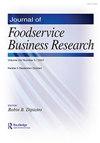约旦消费者的新鲜心态、卫生观念、二维码菜单和重新用餐的意愿
Q2 Agricultural and Biological Sciences
引用次数: 0
摘要
2019冠状病毒病(COVID-19)大流行破坏了整个行业的生态系统,给全球的酒店和餐饮企业带来了挑战。关闭和临时关闭的决定是必要的,因为政府及其机构的首要关注点是其人民的安全。最近,限制已经放松,疫苗已经开发出来,尽管如此,严格的措施仍然完好无损。那么,重要的问题是,什么因素可以说服消费者调整和/或恢复对消费者的信心,在“新常态”的旗帜下回到餐馆用餐。为了提供初步的见解,本文通过强化理论研究了具有新鲜心态的消费者,餐厅卫生和QR码菜单使用对再次用餐意愿的影响。结构方程建模技术应用于从约旦多个城市在豪华餐厅用餐的消费者(n = 569)中获得的调查数据。分析结果表明,消费者的新鲜心态、餐厅卫生和QR码菜单使用情况是消费者在约旦餐馆和餐馆再次用餐意愿的重要预测因素。这项研究加深了我们对后新冠时代消费者饮食偏好和行为的认识。它还对理论假设的强化做出了增量贡献。对理论和实践的启示是为有关利益相关者规定的。《餐饮服务商业研究杂志》版权归Taylor & Francis有限公司所有,未经版权所有者明确书面许可,其内容不得复制或通过电子邮件发送到多个网站或发布到listserv。但是,用户可以打印、下载或通过电子邮件发送文章供个人使用。这可以删节。对副本的准确性不作任何保证。用户应参阅原始出版版本的材料的完整。(版权适用于所有人。)本文章由计算机程序翻译,如有差异,请以英文原文为准。
Fresh mindset, hygiene perception, QR code menu, and intention to re-dine among Jordanian consumers
The COVID-19 pandemic has confronted hospitality and restaurant business enterprises across the globe by disrupting the entire ecosystem of the industry. Shutdowns and temporary closure decisions were necessary, as the primary focus for governments and their agencies is the safety of their people. Recently, restrictions have been eased and vaccines have been developed, despite this, strict measures are still intact. The important question, then, is what are the factors that can convince consumers to adjust and/or restore confidence in consumers to go back to dining in restaurants under the "new normal” banner. To provide preliminary insights, this paper investigates the impact of consumers with fresh mind-sets, restaurant hygiene, and QR code menu usage on intention to re-dine by building on reinforcement theory. Structural equation modeling technique was applied on survey data obtained from consumers who dined in luxury restaurants (n = 569) across multiple cities in Jordan. Results from the analyses illustrate that consumer fresh mind-sets, restaurant hygiene, and QR code menu usage are important predictors for consumer intention to re-dine in Jordanian eateries and restaurants. This research advances our knowledge on consumers' preferences and behaviors to dine in the post-Covid-19 era. It also makes an incremental contribution to the reinforcement of theoretical assumptions. Implications for theory and practice are prescribed for the concerned stakeholders. [ FROM AUTHOR] Copyright of Journal of Foodservice Business Research is the property of Taylor & Francis Ltd and its content may not be copied or emailed to multiple sites or posted to a listserv without the copyright holder's express written permission. However, users may print, download, or email articles for individual use. This may be abridged. No warranty is given about the accuracy of the copy. Users should refer to the original published version of the material for the full . (Copyright applies to all s.)
求助全文
通过发布文献求助,成功后即可免费获取论文全文。
去求助
来源期刊

Journal of Foodservice Business Research
Agricultural and Biological Sciences-Food Science
CiteScore
4.40
自引率
0.00%
发文量
52
期刊介绍:
The Journal of Forecasting is an international journal that publishes refereed papers on forecasting. It is multidisciplinary, welcoming papers dealing with any aspect of forecasting: theoretical, practical, computational and methodological. A broad interpretation of the topic is taken with approaches from various subject areas, such as statistics, economics, psychology, systems engineering and social sciences, all encouraged. Furthermore, the Journal welcomes a wide diversity of applications in such fields as business, government, technology and the environment.
 求助内容:
求助内容: 应助结果提醒方式:
应助结果提醒方式:


